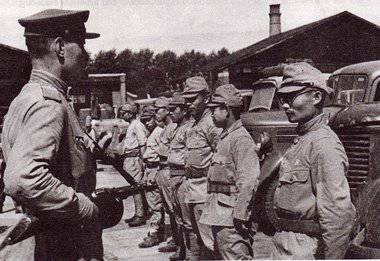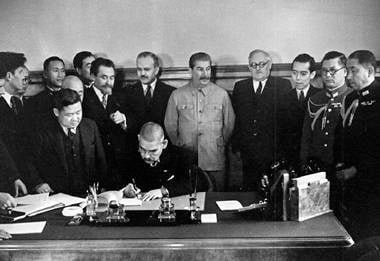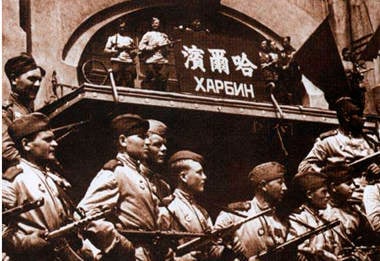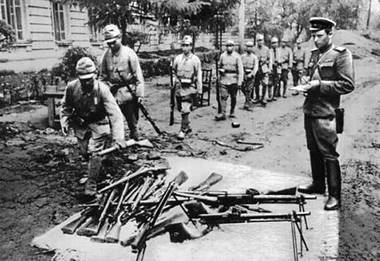Right story. As the Japanese emperor announced the surrender
 Most of the works of American historians of World War II state that the government of militarist Japan capitulated 1945 in August as a result of US atomic strikes on the Japanese cities of Hiroshima and Nagasaki. At the same time, the participation of the USSR in the war in the Far East is regarded as a "secondary", if not completely, "unnecessary" action. In Japan, the Soviet Union’s joining in with the numerous requests of the allies, the United States and Great Britain, to military actions to defeat the Japanese troops is called the right forces of this country "Soviet aggression" taken against the Land of the Rising Sun that was supposedly ready for capitulation in order to "seize territories". At the same time, the fact that the Japanese government and military command were not going to capitulate after the destruction of Hiroshima by the atomic bomb is obscured.
Most of the works of American historians of World War II state that the government of militarist Japan capitulated 1945 in August as a result of US atomic strikes on the Japanese cities of Hiroshima and Nagasaki. At the same time, the participation of the USSR in the war in the Far East is regarded as a "secondary", if not completely, "unnecessary" action. In Japan, the Soviet Union’s joining in with the numerous requests of the allies, the United States and Great Britain, to military actions to defeat the Japanese troops is called the right forces of this country "Soviet aggression" taken against the Land of the Rising Sun that was supposedly ready for capitulation in order to "seize territories". At the same time, the fact that the Japanese government and military command were not going to capitulate after the destruction of Hiroshima by the atomic bomb is obscured.Japanese leaders hid from the people a message about the use of the atomic power of the Americans weapons and continued to prepare for the decisive battle on their territory "to the last Japanese." The issue of the bombing of Hiroshima was not even discussed at a meeting of the Supreme Council for the leadership of the war. The warning of American President G. Truman against 7 of August on the radio about the readiness of the US to launch new atomic strikes was interpreted by the Japanese government as propaganda by the Allies.
The signing of the non-aggression pact between Japan and the USSR. 1941
 Despite the atomic bombing, the supporters of the “war party” continued the training of the population deployed throughout the country to resist the enemy in case of invasion - women, children and the elderly taught methods of dealing with bamboo copies, and guerrilla war bases were created in the mountains. The creator of the kamikaze suicide squads, deputy chief of the main naval headquarters, Onisi Takadziro, categorically speaking against surrender, said at a government meeting: "Having sacrificed 20 lives of millions of Japanese in special attacks, we will achieve absolute victory."
Despite the atomic bombing, the supporters of the “war party” continued the training of the population deployed throughout the country to resist the enemy in case of invasion - women, children and the elderly taught methods of dealing with bamboo copies, and guerrilla war bases were created in the mountains. The creator of the kamikaze suicide squads, deputy chief of the main naval headquarters, Onisi Takadziro, categorically speaking against surrender, said at a government meeting: "Having sacrificed 20 lives of millions of Japanese in special attacks, we will achieve absolute victory."Until recently, there were hopes of using the Kwantung Army, which retained its combat capability. An option was also considered to transfer the emperor and his family to the puppet state of Manzhou-Guo created by the Japanese after the occupation of Northeast China in the event of the landing of American troops on the Japanese islands in order to continue resistance here.
Contrary to the claims of official Japanese historians that “the USSR attack was unexpected,” in fact, Tokyo received timely intelligence information about the Yalta agreement on the upcoming entry of the Soviet Union into the war with Japan on the side of the allies. 15 February 1945, Japanese intelligence leaders informed the Supreme Council for War Leadership that "the Soviet Union intends to secure a voice in deciding the future of East Asia." A warning sounded that by the spring the USSR could terminate the neutrality pact and join the allies in the war against Japan. The next day, Japanese Minister of Foreign Affairs Shigemitsu Mamoru told Emperor Hirohito about this: “The days of Nazi Germany are numbered. The Yalta Conference reaffirmed the unity of Great Britain, the United States and the Soviet Union. ” The minister recommended that the Mikado not rely on a neutrality pact. General Tojo Hideki also warned the emperor about the possibility of the USSR acting against Japan, assessing this possibility as “50 on 50”.
In preparation for entering the war with Japan, the Soviet government sought to comply with the norms of international law. 5 on April 1945 of the year the Japanese government officially announced the denunciation of the Soviet-Japanese neutrality pact of April 13 of 1941. The statement of the Soviet government indicated that the pact was signed before the German attack on the USSR and before the outbreak of war between Japan on the one hand and Great Britain and the United States on the other. The text of the statement read: “Since then, the situation has changed radically. Germany attacked the USSR, and Japan, an ally of Germany, helps the latter in its war against the USSR. In addition, Japan is at war with the United States and Britain, which are allies of the Soviet Union.
In this situation, the Neutrality Pact between Japan and the USSR lost its meaning, and the extension of this pact became impossible ...
In accordance with the article 3 of the said Pact, which provides for the right to denounce one year before the expiry of the five-year term of the Covenant, the Soviet Government hereby declares ... its desire to denounce the Covenant of 13 on April 1941 of the year. ”
Having denounced the neutrality pact, the Soviet government, in fact, four months prior to the entry into the war, actually informed the Japanese government about the possibility of the USSR participating in the war with Japan on the side of the allied United States and Great Britain. Tokyo understood this well. Already this fact makes unconvincing and helpless attempts of modern Japanese propagandists and their supporters found in recent years in our country, trying to accuse the USSR of "perfidy and perfidy."
The preparation of the USSR for entry into the war was impossible to hide. Since the spring of 1945, the Japanese leadership has regularly received from intelligence information on the redeployment of Soviet troops to the Far East. In the middle of April, officers of the Japanese Embassy’s military office in Moscow reported to Tokyo: “Every day, the 12 to 15 trains pass by the Trans-Siberian Railway ... Currently, the Soviet Union’s entry into the war with Japan is inevitable. It will take approximately two months to deploy about 20 divisions. ” The same was reported by the headquarters of the Kwantung Army.
This 6 of June 1945 of the year at the next meeting of the Supreme Council for the management of war, the assessment of the real situation did not inspire optimism. In an analysis of the situation presented to the council members, it was stated: “Through consistent measures taken, the Soviet Union prepares the ground through diplomacy in order to be able to oppose the Empire if necessary; at the same time he intensifies military preparations in the Far East. There is a high probability that the Soviet Union will take military action against Japan ... The USSR may enter the war against Japan after the summer or autumn period. "
Nevertheless, at the meeting of the council it was decided to continue the war: “The empire must firmly follow the course of the protracted nature of the war, regardless of any casualties. By the end of this year, this can not cause significant fluctuations in the enemy's determination to continue the war. ” In Tokyo, they still hoped for the United States and Great Britain to accept the compromise conditions of the world, which, in particular, provided for the preservation of Japan and Korea and Japan. On the other hand, diplomatic measures were taken to use the Soviet Union as an intermediary in the cessation of hostilities under conditions that satisfied Tokyo. However, in the “peace proposals” submitted to the Soviet government, the question of the Japanese ending the war was not directly addressed. In the USSR, naturally, they could not agree to any negotiations other than surrender, and therefore the Japanese proposals for mediation were rejected. The attempt of the Japanese government to send in July 1945 of the year to Moscow as a special emissary of an influential politician, the former Prime Minister of Japan, Prince Kono Fumimaro, was not crowned with success. 12 July in the NKID (MFA) of the USSR was sent the message of Emperor Hirohito, which said about his desire to "put an end to the war." However, the question of the cessation of hostilities by Japan was again avoided. 18 July NCID informed Tokyo: "The Soviet government does not see an opportunity to give any definite answer about the message of the emperor, as well as the mission of Prince Konoe ..."
26 July 1945, the Potsdam Declaration of the states at war with Japan was published, setting out the conditions for its unconditional surrender. On the eve of its text was broadcast on radio and became known in Japan. The Soviet government found it expedient to join the declaration, but to announce it a little later. The absence of the signature of the Soviet Union under the Potsdam Declaration gave rise to the hope of the Japanese leadership that the war would continue, because in Japan the inevitability of defeat was associated only with the entry of the USSR into it. After discussing the text of the declaration at a meeting of the High Council on War Management, Japanese Foreign Minister Togo Shigenori telegraphed Ambassador Sato Naotake in Moscow on July 27: “The position taken by the Soviet Union regarding the Potsdam Joint Declaration will influence our actions from now on ...”
In this regard, there is reason to believe that Japan’s refusal to capitulate on the terms of the Potsdam Declaration was dictated by the still persisting hopes that the Soviet Union’s entry into the war could be avoided or at least delayed by decisive diplomatic steps. concessions. Anyway, 28 July at a press conference, Japanese Prime Minister Suzuki Kantaro said about the Potsdam Declaration: “We ignore it. We will steadily go forward and wage war to the end. " Interestingly, after the war, Japanese historians tried to prove the “imperfection of the translation” of Suzuki’s statement. They argued that the Japanese word “mokusatsu” was not equivalent to the notion of “ignore”. Note that this is true, but only in the sense that “mokusatsu” is an even stronger and contemptuous expression, meaning “murder by silence”.
The position taken by the Japanese government delayed the end of the Second World War, leading to new victims and deprivations of peoples. Therefore, in strict accordance with the deadlines defined in the Yalta Agreement, the Soviet Union 8 August 1945 of the year declared war on Japan. The statement of the Soviet government said: “After the defeat and surrender of Germany, Japan turned out to be the only great power that still stands for the continuation of the war.
Soviet soldiers in Harbin.
 The demand of the three powers - the United States of America, Great Britain and China - from 26 of July of this year about the unconditional surrender of the Japanese armed forces was rejected by Japan. Thus, the proposal of the Japanese Government to the Soviet Union to mediate in the war in the Far East loses all ground.
The demand of the three powers - the United States of America, Great Britain and China - from 26 of July of this year about the unconditional surrender of the Japanese armed forces was rejected by Japan. Thus, the proposal of the Japanese Government to the Soviet Union to mediate in the war in the Far East loses all ground.Given Japan’s refusal to capitulate, the Allies appealed to the Soviet Government with a proposal to join the war against Japanese aggression and thereby shorten the time for the end of the war, reduce the number of casualties and promote the early restoration of universal peace.
True to its allied duty, the Soviet Government accepted the proposal of the allies and joined the Allied states ’statement of July of this year.
The Soviet government believes that ... its policy is the only means capable of bringing the offensive of peace closer, freeing the people from further sacrifices and suffering, and giving the Japanese people the opportunity to get rid of the dangers and destruction that Germany experienced after its rejection of unconditional surrender.
In view of the above, the Soviet Government declares that starting tomorrow, that is, from August 9, the Soviet Union will consider itself at war with Japan. ”
The Soviet troops were tasked with defeating the Kwantung Army (actually a group of armies), as well as the Japanese troops in Korea, in the shortest possible time and with minimal losses, to liberate South Sakhalin and the Kuril Islands, torn away from Russia. This task was completed with honor. The group of Soviet troops created in the spring-summer of 1945 in the Far East numbered over 1,7 million people, about 30 thousand guns and mortars, 5250 tanks and self-propelled guns, more than 5 thousand combat aircraft. The sweeping crushing blows of the Soviet troops on the front of more than 5 thousand km made it possible to completely defeat the formations and units of the Kwantung Army. For the Japanese army, this was the largest defeat in the war. In 24 days, 22 Japanese divisions were defeated. The loss of the Japanese killed and captured amounted to over 674 thousand people.
Even before the defeat of the Kwantung Army in the morning of 9 on August 1945, the Foreign Minister of Togo was convincing Prime Minister Suzuki that the entry of the Soviet Union into the war leaves for Japan no choice but to accept the terms of the Potsdam Declaration. The influential minister-keeper of the imperial press, Kido Koichi, reported to Hirohito about the need to immediately stop the war. At the same time, fear was expressed that otherwise defeat in the war could push the masses to revolution. In an effort to avoid this, the political leadership of the country and the emperor’s entourage considered it necessary to capitulate to the Americans and the British as soon as possible in order to prevent the Soviet Union from landing on the Japanese islands. Prime Minister Suzuki, speaking out against attempts by the military to delay the final decision on surrender, said at a meeting in the presence of the emperor that "it is necessary to put an end to the war while we are dealing with the Americans."
Soldiers of the Kwantung Army surrender their weapons.
 At an emergency meeting of the High Council on War Leadership, August 9, Prime Minister Suzuki stated: “Joining the Soviet Union’s war this morning puts us in a hopeless situation and makes it impossible to continue the war.”
At an emergency meeting of the High Council on War Leadership, August 9, Prime Minister Suzuki stated: “Joining the Soviet Union’s war this morning puts us in a hopeless situation and makes it impossible to continue the war.”At noon 15 August 1945, the Japanese for the first time in all history the existence of the state heard the voice of their divine monarch, who, in a language difficult for commoners, announced the decision to end the war. As a justification for the impossibility of further resistance, it was pointed out that the enemy was using a new superbomb. Thus, it was made clear that Japan does not surrender, having suffered a defeat in a fair battle with the enemy, but is forced to retreat before the overwhelming force of a weapon unseen before. In this regard, in Japan there are still those who believe that the use of atomic bombs by the Americans was "tenyu" - the will of providence, the grace of heaven, which allowed the sacred nation of Yamato to leave the war with honor, without losing face.
In reality, the inevitability of the defeat of Mikado and its inner circle was associated not so much with atomic bombings as with the participation in the war, which crushed the military power of Nazi Germany of the Red Army. In the rescript dated August 17, 1945 "To soldiers and sailors," the commander in chief of the army and fleet Emperor Hirohito of Japan, no longer mentioning the American atomic bombs and the destruction of Japanese cities, named the entry into the war of the USSR as the main reason for surrender. It was clearly stated: "Now that the Soviet Union has entered the war against us, to continue the resistance ... means to jeopardize the very foundation of our Empire."
The facts show that without the USSR entering the war, the Americans could not quickly conquer Japan, “throwing atomic bombs at it”, as American military propaganda convinced the leaflets and radio on the Japanese people. According to the calculations of the American headquarters, at least nine atomic bombs were required to ensure the landing of assault forces on the Japanese islands. After the attacks on Hiroshima and Nagasaki, the United States no longer had ready-made atomic bombs, but the production of new ones required a long time. “These bombs dropped by us,” testified US Secretary of War G. Stimson, “were the only ones we had, and the production rates at that time were very low.” It should not be forgotten that in response to the atomic strikes, the Japanese could bring down American secret laboratories in huge quantities of bacteriological weapons accumulated in the Northeast China. This danger threatening the whole world was prevented by the entry of the USSR into the war. The former commander of the Kwantung Army, General Yamada Otozo, admitted at the trial: “The Soviet Union’s entry into the war against Japan and the rapid advance of Soviet troops deep into Manchuria prevented us from using bacteriological weapons ...”
An unbiased analysis of the military-political situation in August 1945 in the Far East makes even irreconcilable critics of the Soviet leadership admit the obvious. Thus, in a large-scale scientific study published in 2005 of the reasons for the capitulation by the Japanese government, a professor at the University of California (USA), the ethnic Japanese Hasegawa Tsuyoshi, recognizes the decisive influence of the Soviet Union’s entry into the war on the emperor’s decision to accept the terms of surrender. In the final part of his work “In pursuit of the enemy. Stalin, Truman and the capitulation of Japan "he writes:" The two atomic bombs dropped on Hiroshima and Nagasaki were not decisive when Japan made a decision to capitulate. Despite the crushing power of atomic bombs, they were not enough to change the vector of Japanese diplomacy. This allowed to make the Soviet invasion. Without the entry of the Soviet Union into the war, the Japanese would continue to fight until numerous atomic bombs were dropped on them, the Allies landed successfully on the islands of Japan itself, or aerial bombardments continued under naval blockade, which would exclude the possibility of further resistance. "
Having entered the war, the Soviet Union made a decisive contribution to the defeat of the Japanese ground forces, deprived the Japanese leadership of the chances of continuing military operations by resorting to a bloody “battle for the metropolis”, which saved hundreds of thousands, if not millions of human lives, including the Japanese.
Information